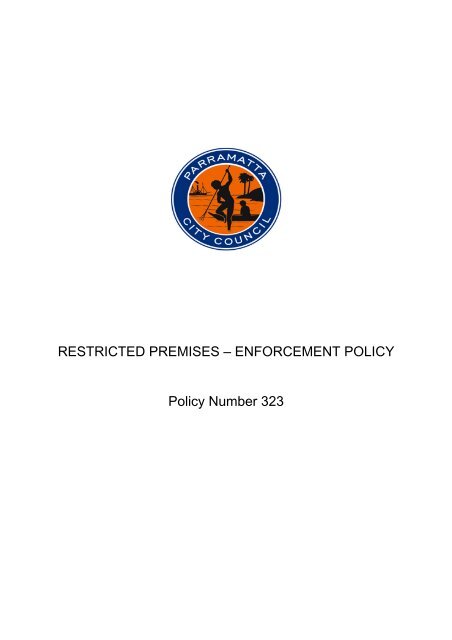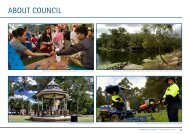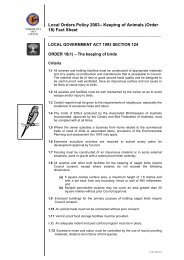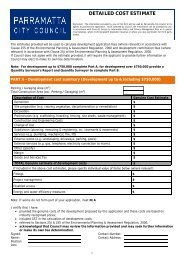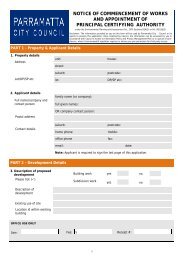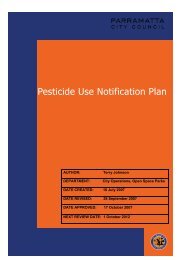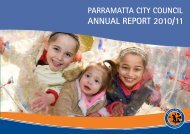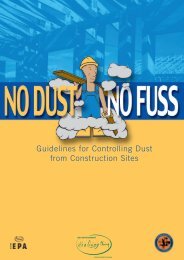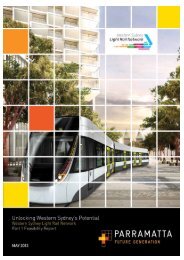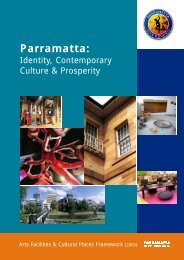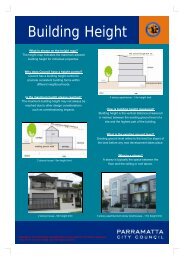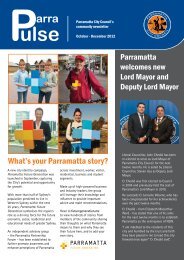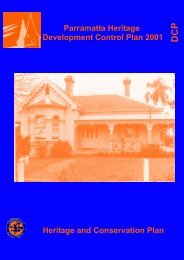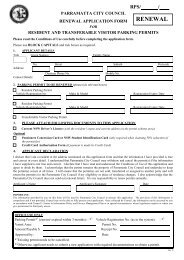Restricted Premises Enforcement Policy - Parramatta City Council
Restricted Premises Enforcement Policy - Parramatta City Council
Restricted Premises Enforcement Policy - Parramatta City Council
You also want an ePaper? Increase the reach of your titles
YUMPU automatically turns print PDFs into web optimized ePapers that Google loves.
RESTRICTED PREMISES – ENFORCEMENT POLICY<strong>Policy</strong> Number 323
Draft <strong>Restricted</strong> <strong>Premises</strong> <strong>Policy</strong>TABLE OF CONTENTS1.0 Introduction___________________________________________________ 31.1 Background_________________________________________________ 31.2 Purpose____________________________________________________ 41.3 Objectives __________________________________________________ 51.4. <strong>Parramatta</strong> <strong>City</strong> <strong>Council</strong> Guiding Principles ________________________ 52.0 CRITERIA FOR RESPONSE _____________________________________ 52.1 Principles for Response _______________________________________ 52.2 Factors for Response _________________________________________ 63.0 REQUIREMENTS______________________________________________ 73.1 <strong>Enforcement</strong> Activities ________________________________________ 73.2 Hierarchy for Response _______________________________________ 74.0 MANAGING COMPLAINTS _____________________________________ 104.1 Access to Information ________________________________________ 104.2 Customer Request Management System (CRMS)__________________ 104.3 Staff Conducting Inspections __________________________________ 104.4 Matters for Consideration _____________________________________ 114.5 Inspection Records __________________________________________ 114.6 Reporting _________________________________________________ 114.7 Authorisations ______________________________________________ 114.8 Fees _____________________________________________________ 125.0 LEGAL PROCESS ____________________________________________ 135.1 Civil Proceedings ___________________________________________ 135.2 Prosecution Procedures ______________________________________ 135.3 Penalty Infringement Notices __________________________________ 135.4 Grievances ________________________________________________ 135.5 Privacy ___________________________________________________ 145.6 Audit and Probity____________________________________________ 146.0 OTHER MATTERS____________________________________________ 146.1 Review Period______________________________________________ 14<strong>Parramatta</strong> <strong>City</strong> <strong>Council</strong> 2
Draft <strong>Restricted</strong> <strong>Premises</strong> <strong>Policy</strong>1.0 INTRODUCTION1.1 BackgroundThis <strong>Policy</strong> applies to Brothels and Related sex use premises and should be read inconjunction with the <strong>Parramatta</strong> <strong>City</strong> <strong>Council</strong>’s <strong>Enforcement</strong> <strong>Policy</strong>.This <strong>Policy</strong> has been prepared to facilitate an effective and consistent approach toenforcement of controls on Brothels and Related sex use premises under the lawsrelating to operation of those premises.This <strong>Policy</strong> will help align enforcement actions across all arms of <strong>Council</strong>, namelythe Regulatory Services Unit and the Development Services Unit, as they monitorand regulate business activities and premises within the <strong>Parramatta</strong> localgovernment area.This <strong>Policy</strong> applies to all <strong>Council</strong>’s activities relating to Brothels and Related sex usepremises and it sets out the process on how incidents will be escalated between theenforcement arms of <strong>Council</strong>.1.2 DefinitionsIn this <strong>Policy</strong>:Brothel means premises:(a)(b)(c)habitually used for the purposes of prostitution, orthat have been used for the purposes of prostitution and are likely to be usedagain for that purpose, orthat have been expressly or implicitly:(i)(ii)advertised (whether by advertisements in or on the premises,newspapers, directories or the internet or by other means), orrepresented,as being used for the purposes of prostitution, and that are likely to be used forthe purposes of prostitution (and premises may constitute a Brothel even thoughused by only one prostitute for the purposes of prostitution).<strong>Enforcement</strong> Fee means the fee charged by <strong>Council</strong> in connection with theinspections of premises that are undertaken for the purposes of taking enforcementaction as a result of any non compliance with development consent or offence underany laws relating to the use and occupation of the premises or both..Monitoring Fee means the fee charged by <strong>Council</strong> in connection with theinspections of premises that are undertaken for the purposes of assessingcompliance with development consent or any laws relating to the use andoccupation of the premises or both.High Risk <strong>Premises</strong> means any premises that <strong>Council</strong> staff consider have a highrisk of non compliance with development consent or any laws relating to the use and<strong>Parramatta</strong> <strong>City</strong> <strong>Council</strong> 3
Draft <strong>Restricted</strong> <strong>Premises</strong> <strong>Policy</strong>occupation of the premises or both and such premises may include (withoutlimitation):(a)(b)Brothels; orpremises that conduct massage parlour operations in relation to which:(i)(ii)(iii)there are genuine concerns of unauthorised sex related activitiesoccurring on the site; orthere exists evidence of a pattern of unauthorised sex relatedactivities; orcomplaints have been received from the public alleging unauthorisedsex related activities; or(c)premises that are identified as potentially having occupational health andsafety risks.Low Risk <strong>Premises</strong> means all premises that are not considered High Risk<strong>Premises</strong>.Related sex use means the following:(a)(b)(c)the use of premises for the provision of sexual acts or sexual services inexchange for payment;the use of premises for the provision of massage services (other thangenuine remedial or therapeutic massage services) in exchange forpayment;the use of premises for the provision of adult entertainment involving nudity,indecent acts or sexual activity if the entertainment is provided in exchangefor payment or if the entertainment is ancillary to the provision of other goodsor services.1.3 PurposeTo prepare and implement a policy that guides regulatory enforcement activity inrelation to Brothels and Related sex use premises in the <strong>Parramatta</strong> localgovernment area in a manner that aligns with <strong>Council</strong>’s “umbrella” <strong>Enforcement</strong><strong>Policy</strong>. In this context, this <strong>Policy</strong> will:• Confirm that <strong>Council</strong> has a minimal tolerance approach to unlawful activity andnon compliance with development consents.• Implement <strong>Council</strong>’s resolution of 26 May 2008 which states that <strong>Council</strong> moveto 6 monthly sex service premises inspections (ie brothels, sex on premisesfacilities, therapeutic massage facilities, massage parlours).• Provide consistency in enforcement matters of environmental breaches,development non-compliance, and to ensure transparency, procedural fairnessand natural justice.<strong>Parramatta</strong> <strong>City</strong> <strong>Council</strong> 4
Draft <strong>Restricted</strong> <strong>Premises</strong> <strong>Policy</strong>• Acknowledge an obligation under relevant sections of legislation to ensure thatthe exercise of its regulatory power is carried out consistently and without bias.• To set the criteria for the regulation of the types of premises covered by this<strong>Policy</strong>1.3 ObjectivesThe objectives of this <strong>Policy</strong> are:• to inform the public of the principles and measures that <strong>Council</strong> staff will apply inits compliance and enforcement activities relating to Brothels and Related sexuse premises;• to provide guidance to <strong>Council</strong> staff in pursuing enforcement options;• to implement a fair and equitable enforcement system consistently across the<strong>Parramatta</strong> local government area and• to provide a mechanism to enable <strong>Council</strong> to recover the costs of regulating andmonitoring Brothels and Related Sex use premises1.4. <strong>Parramatta</strong> <strong>City</strong> <strong>Council</strong> Guiding Principles<strong>Council</strong>’s guiding principles will apply to all actions taken under this <strong>Policy</strong>.<strong>Council</strong>’s guiding principles are:• Cooperative teamwork• Customer service• Sustainability and Community focus• Leadership• Accountability• Integrity• Communication• Excellence• Innovation• RespectThese guiding principles align with the values and principles of <strong>Council</strong> together with therequirements of any relevant legislation2.0 CRITERIA FOR RESPONSE2.1 Principles for Response<strong>Council</strong> staff will:• act in the public interest;• act consistently, impartially and fairly according to law;• promote consistency through effective liaison with field staff and theadherence to policies and procedures;<strong>Parramatta</strong> <strong>City</strong> <strong>Council</strong> 5
Draft <strong>Restricted</strong> <strong>Premises</strong> <strong>Policy</strong>• not discriminate on the basis of race, religion, sex, national origin or politicalassociation;• ensure that enforcement action is taken against the right person for the rightoffence;• ensure that all relevant evidence is placed before Courts or appeal tribunals;• inform those being regulated of their legal obligations and have relevantpersonnel available during normal office hours to assist with enquiries aboutlegislative requirements;• discuss specific compliance failures or problems and provide advice onmechanisms that can be used to improve compliance;• confirm advice in writing when requested and provide written advice in aclear and simple manner, explaining what and why remedial work is to beundertaken, over what time scale and ensuring legal requirements areexplained;• advise those being regulated of their right of appeal where provided by lawand• provide alleged offenders with an opportunity to discuss the circumstances oftheir case.This <strong>Policy</strong> aligns with the <strong>Council</strong> values and guiding principles together with therequirements of any relevant legislation.2.2 Factors for ResponseThe following factors will be considered and balanced in making a decision as to thetype of environmental incident enforcement action that is applied:• the seriousness of the harm or potential harm caused by the alleged offence;• the level of malice or culpability of the suspect - was the offence intentional,reckless, negligent, or a mistake?;• whether the alleged offender has a history of prior contraventions;• the age, physical or mental health or special infirmity of the alleged offender;• the alleged offender's background, including culture and language ability;• whether the suspect cooperated with authorities when the offence wasdetected;• the likelihood of the offence continuing or being repeated;• any mitigating or aggravating circumstances;• the standard of evidence that has been collected;• the length of time since the alleged offence;• whether the consequences of any conviction would be unduly harsh oroppressive;• whether court orders are required to prevent a recurrence of the offence;• the prevalence of the alleged offence and the need for deterrence, bothspecifically and generally:<strong>Parramatta</strong> <strong>City</strong> <strong>Council</strong> 6
Draft <strong>Restricted</strong> <strong>Premises</strong> <strong>Policy</strong>• the cost of the proposed response option compared to the benefits of thatoption; and• the likely public perception of the offence and the manner with which it isdealt.However, the overriding consideration in taking enforcement action will always bethe public interest.3.0 REQUIREMENTS3.1 <strong>Enforcement</strong> Activities<strong>Council</strong> resolved to move to 6 monthly sex service premises inspections (ie brothels,sex on premises facilities, therapeutic massage facilities, and massage parlours), toensure premises conducting those activities comply with development consent andlaws relating those activities. <strong>Council</strong> also receives information about suspectedcontraventions, illegal uses and non-compliances from members of the public, otheragencies and monitoring activities.Monitoring activities include:• random inspections;• intelligence gathering;• routine patrols; and• targeted investigations.3.2 Hierarchy for ResponseThe following hierarchy of actions detail how incidents escalate from minor offencesthrough to significant offences. To assist <strong>Council</strong> in determining the appropriateaction required, premises are categorised as Low Risk or High Risk:Low RiskFor Low Risk premises the hierarchy of actions includes;(a)Technical Breaches – “Minor Offences” Verbal and Formal (written) warningsA technical breach is where a condition of development consent is not beingcomplied with such as the hours of operation or number of persons on thepremises.A verbal direction can be given in circumstances where there exists atechnical breach and the alleged offender immediately:.• cooperates by proceeding to take steps to comply with the informalrequest;• takes action to rectify the problem which is the subject of the verbaldirection at the time of the request / inspection;<strong>Parramatta</strong> <strong>City</strong> <strong>Council</strong> 7
Draft <strong>Restricted</strong> <strong>Premises</strong> <strong>Policy</strong>A verbal direction would also be appropriate in circumstances where thereexists a technical breach and prosecution is unlikely if the person fails tocomply because of the nature of the technical breach.As many technical breaches as are required can be issued against one site,although this is where the judgement call will come into play. If for example a<strong>Council</strong> staff member requires the premises to close, cease operating asthey are open outside of the approved times and they only comply for thatday and they are found that this has not ceased the daily operationalrequirement, this should then escalate to a formal warning and legalenforcement.Formal Warnings will be issued when the operator has complied with theverbal direction but did not show any contrition or the <strong>Council</strong> staff memberconsiders that the incidence would reoccur.A formal warning will also be used if:• there has been an unsatisfactory response to an informal request;• the alleged offender is uncooperative or past experience indicates thatthe they are unlikely to comply unless a formal notice is issued;• the <strong>Council</strong> staff member requests information or records from a thirdparty who may be concerned about their privacy or confidentialityobligations. The statutory requirement to provide the information ordocuments will protect the addressee against liability for a breach ofprivacy or confidentiality.Formal warnings will be formally recorded and kept in <strong>Council</strong> RecordsManagement system.A copy of the Formal Warning will be posted, faxed or emailed to the personwho, in the opinion of the officer, is in possession of the approval.All formal warnings must:• be addressed to the correct legal entity (this must be an individual or acorporation);• state clearly what the warning is being given for and requires;• give the addressee reasonable time to comply; and• be signed by an authorised council officerIf on returning to premises after a formal warnings has been issued andrecommended action has not been taken, the <strong>Council</strong> staff member maydecide to elevate the action to appropriate legal enforcement.(b)Penalty Infringement Notices<strong>Council</strong> has the discretion to issue Penalty Infringement Notices for offencesunder the applicable laws (including the Environmental Planning and<strong>Parramatta</strong> <strong>City</strong> <strong>Council</strong> 8
Draft <strong>Restricted</strong> <strong>Premises</strong> <strong>Policy</strong>Assessment Act). This discretion should be exercised in cases where thematter is not considered serious enough to warrant a Court imposedpenalty/order however the breach does warrant punitive action.(c)Notices and Orders<strong>Council</strong> has the power to issue a wide range of other notices and orders.<strong>Council</strong> staff may use the enforcement provisions of the EnvironmentalPlanning and Assessment Act and related laws to regulate breaches throughnotices and orders.A notice or order may impose requirements on the addressee which maylead to prosecution if they fail to comply. Therefore, before deciding to issuea notice or order, it is important to consider whether the circumstances meritthis course of action or whether it would be more appropriate to make aninformal request.Where a person is afforded the right to make representations to a notice,<strong>Council</strong> requires those representations to be made in writing. This ensuresrepresentation documents can be recorded and filed in <strong>Council</strong>’s recordsystem. After written representations are considered, representations inperson may be made if <strong>Council</strong> feels appropriate. <strong>Council</strong> will respond to allrepresentations in writing(d)Brothel Closure OrdersHigh RiskBrothel closure orders shall only be issued on premises where <strong>Council</strong> isable to prove the existence of prostitution. Brothel closure orders may beused to regulate an unauthorised use of a premise or to bring premises intocompliance with its development consent. Brothel closure orders shall beissued for serious breaches which are unable to be rectified immediately orwhere there is a demonstrated pattern of disregard for the conditions ofdevelopment consent.<strong>Council</strong> will take a ‘zero tolerance’ approach to High Risk premises. The followinghierarchy of actions will assist <strong>Council</strong> staff in the performance of their duties inrelation to High Risk premises:(a)Penalty Infringement Notices<strong>Council</strong> has the discretion to issue Penalty Infringement Notices for offencesunder the Environmental Planning and Assessment Act and related laws.This discretion should be exercised in cases where the matter is notconsidered serious enough to warrant a Court imposed penalty/orderhowever the breach does warrant punitive action.(b)Notices and Orders<strong>Council</strong> has the power to issue a wide range of other notices and orders.<strong>Parramatta</strong> <strong>City</strong> <strong>Council</strong> 9
Draft <strong>Restricted</strong> <strong>Premises</strong> <strong>Policy</strong><strong>Council</strong> staff may use the enforcement provisions of the EnvironmentalPlanning and Assessment Act and related laws to regulate breaches throughnotices and orders.A notice or order may impose requirements on the addressee which maylead to prosecution if they fail to comply. Therefore, before deciding to issuea notice or order, it is important to consider whether the circumstances meritthis course of action or whether it would be more appropriate to make aninformal request.Where a person is afforded the right to make representations to a Notice,<strong>Council</strong> requires those representations to be made in writing. This ensuresrepresentation documents can be recorded and filed in <strong>Council</strong>’s recordsystem. After written representations are considered, representations inperson may be made if <strong>Council</strong> feels appropriate. <strong>Council</strong> will respond to allrepresentations in writing(c)Brothel Closure OrdersBrothel closure orders shall only be issued on premises where <strong>Council</strong> isable to prove the existence of prostitution as defined under legislation.Brothel closure orders may be used to regulate an unauthorised use of apremise or to bring a premise into compliance with its development consent.Brothel closure orders shall be issued for serious breaches which are unableto be rectified immediately or where there is a demonstrated pattern ofdisregard for the conditions of development consent.4.0 MANAGING COMPLAINTS4.1 Access to Information<strong>Council</strong> staff have access to a wide range of information concerning Brothels andRelated sex use premises both during and after normal office hours. <strong>Council</strong> willmanage all data and will ensure that it is accessible after hours to <strong>Council</strong> staff whorequire such access to adequately carry out their duties.4.2 Customer Request Management System (CRMS)People involved in the receipt of complaints must have good quality guidance as towhere those complaints are to be directed.As a guide:All verbal complaints shall be registered in <strong>Council</strong>s CRMS system.All written complaints shall be registered by <strong>Council</strong>s Records department.4.3 <strong>Council</strong> Staff Conducting InspectionsHigh Risk<strong>Council</strong> staff will inspect all complaints and routine random inspections with aminimum of 4 staff. The <strong>Council</strong> staff shall include an officer with the relevantqualifications and skills, and at least one female shall be part of the 4 person team.<strong>Parramatta</strong> <strong>City</strong> <strong>Council</strong> 10
Draft <strong>Restricted</strong> <strong>Premises</strong> <strong>Policy</strong>Low Risk<strong>Council</strong> staff will inspect all complaints and routine random inspections with aminimum of 2 staff. The staff shall include an officer with the relevant qualificationsand skills.4.4 Matters for ConsiderationDuring an inspection of a Brothel or a Related sex use premises <strong>Council</strong> staff maytake a holistic approach to the investigation. This may include, but is not limited to,the following:• Fire Safety Issues;• Public Health Issues;• Compliance with Conditions of Consent; and• Inter-agency joint operations4.5 Inspection RecordsAll unauthorised use inspections shall be video recorded to capture the method ofentry and for staff records.A written file note shall also be undertaken for each inspection and all informationshall be electronically stored in a secure location within <strong>Council</strong>s recordsManagement system.4.6 ReportingComplaints or information about suspected premises can be lodged with the<strong>Council</strong>’s Customer Service Centre on:Telephone: 9806 5050Facsimile: 9806 5903E-mail: parracity.nsw.gov.auAnonymous complaints will be investigated where there is the potential for a seriousrisk to health, safety or the environment ands sufficient details of the incidence andaddress are provided to identify and investigate the matter.All reports of investigations are strictly confidential. However, information maygenerally be made available about the outcome of investigations and the reasons fordecisions provided the information will not cause harm to an informant, witness, orthe alleged offender; or significantly prejudice the administration of justice.4.7 Authorisations<strong>Council</strong> will delegate authority and authorise certain <strong>Council</strong> staff under relevantlegislation in order for them to carry out their investigative duties and take necessaryaction.All authorised <strong>Council</strong> staff who carry out inspections on private land will:<strong>Parramatta</strong> <strong>City</strong> <strong>Council</strong> 11
Draft <strong>Restricted</strong> <strong>Premises</strong> <strong>Policy</strong>4.8 Fees• Have delegation to enter the premises and carry out investigations asspecified in <strong>Council</strong>s delegations; and• Be authorised by <strong>Council</strong> where this is required by specific legislation topermit inspections on private property; and• Carry photographic identification demonstrating authorisation to enterprivate property under the relevant legislation; and• Be conscious of any requirements relating to occupational health andsafety.Section 608 of the Local Government Act allows <strong>Council</strong> to charge and recover anapproved fee for providing a service in connection with the exercise of the <strong>Council</strong>’sregulatory functions (including receiving an application for approval, granting anapproval, making an inspection and issuing a certificate).Where inspections of premises are reasonably necessary to determine if anapproval has been complied with:(a)(b)(c)an approved fee may be charged for such an inspection,an approved fee may not be charged for such an inspection before theapproval Is granted, andan approved fee may not be charged for the inspection of any thing for whichthe council relies on a certificate under section 93 of the Local GovernmentAct that the thing has been done in compliance with the approval.<strong>Council</strong> has the ability to charge an administration fee or a fee for service (that is, aninspection fee for each inspection undertaken). In the interest of providing a fair andequitable service which delivers value for money, fees will only be charged for eachinspection undertaken.. <strong>Council</strong> may charge either a Monitoring Fee or an<strong>Enforcement</strong> Fee.<strong>Council</strong> will only charge the Monitoring Fee for inspections of premises undertakenon a routine basis as part of <strong>Council</strong>’s <strong>Restricted</strong> <strong>Premises</strong> Monitoring program.Inspections conducted in response to complaints or inspections undertaken on arandom basis as part of <strong>Council</strong>’s internal audit will not incur a fee. Where breachesof the development consent, or any other matters requiring follow up action areidentified, the subsequent follow up inspection(s) will be subject to the <strong>Enforcement</strong>Fee. These actions may include; following up on Notices and Orders, issuingPenalty Infringement Notices or instigating legal action.Inspections required as part of enforcing Land and Environment Court consentconditions will not be subject to inspection fees. These include, monitoring consentsthat have been issued for a defined time period on a trial basis.The quantum of the Monitoring Fee and the <strong>Enforcement</strong> Fee are set out in<strong>Council</strong>’s fees and charges that form part of the management plan adopted by<strong>Council</strong> on an annual basis.<strong>Parramatta</strong> <strong>City</strong> <strong>Council</strong> 12
Draft <strong>Restricted</strong> <strong>Premises</strong> <strong>Policy</strong>5.0 LEGAL PROCESS5.1 Civil ProceedingsCivil proceedings may be brought in the Land and Environment Court or the LocalCourt to remedy or restrain serious breaches of law, including threatened oranticipated breaches.5.2 Prosecution ProceduresCriminal proceedings may be commenced where there is sufficient evidence toprove beyond reasonable doubt that a serious offence has been committed.If <strong>Council</strong> staff consider prosecution to be the most appropriate course of actionpreliminary advice should be sought from <strong>Council</strong>’s General Counsel and, ifsufficient evidence has been gathered, a report should be prepared and submitted tothe <strong>Council</strong>.Where prosecution has been selected as the appropriate option, <strong>Council</strong> will notnecessarily proceed against all those who may be potentially liable under thelegislation.The general principles that will be applied are that proceedings will be institutedagainst those who are primarily responsible for the offence and where offences arecommitted by employees, agents or officers of a corporation in the course of theiremployment, proceedings will usually be instituted against the corporation.In taking action against employees their compliance with management proceduresor directions will be taken into consideration. Action will normally only be takenagainst the directors of corporations where there is a failure to exercise duediligence or where there is evidence linking a director or manager with thecorporation's illegal activity.For some offences, legal proceedings must be commenced no later than 2 yearsafter the alleged offence occurs. However, all matters will be prepared for hearingas soon as possible.The charge or charges laid should appropriately reflect the nature and extent of thealleged offences.Legal proceedings may be conducted in the Local Court or the Land andEnvironment Court. The maximum fines that can be imposed by the local Court isless than those which can be imposed by the Land and Environment Court. Thisissue is a consideration in deciding which Court legal proceedings may be taken.5.3 Penalty Infringement NoticesA Penalty Infringement Notice can be issued for an office under the EnvironmentalPlanning and Assessment Act or other relevant laws depending on thecircumstances of the incident.5.4 Grievances<strong>Parramatta</strong> <strong>City</strong> <strong>Council</strong> 13
Draft <strong>Restricted</strong> <strong>Premises</strong> <strong>Policy</strong>Any person who is aggrieved by a decision can contact <strong>Council</strong> staff to discuss thedecision.Formal complaints can be lodged with <strong>Council</strong> by mail, fax or e-mail:Mail: The Chief Executive Officer<strong>Parramatta</strong> <strong>City</strong> <strong>Council</strong>PO BOXPARRAMATTA NSWFacsimile: 9806 5903E-mail: parracity.nsw.gov.au5.5 Privacy<strong>Council</strong> must observe the Information Protection Principles set out in the Privacyand Personal Information Protection Act 1998.Personal information may be shared with other agencies for law enforcementpurposes and <strong>Council</strong> will share such information where appropriate.5.6 Audit and ProbityRegular audits will be undertaken on a random sample of complaints investigated.These audits are to be carried out by an independent person/agency including, butnot limited to, <strong>Council</strong>’s internal audit and review section, and/or independentofficers from other Local Government areas.Regular meetings shall also be conducted with <strong>Council</strong>’s Senior Management,Internal Audit and Review and General Counsel regarding the inspection programfor premises covered by this <strong>Policy</strong>.6.0 OTHER MATTERS6.1 Review PeriodThis <strong>Policy</strong> will be reviewed at 3 yearly intervals by its anniversary date or at anysuch other time as required by the <strong>Parramatta</strong> <strong>City</strong> <strong>Council</strong> to reflect changes inenforcement legislation.Version Date Adopted Date superseded1 27 June 2011OwnerManager Regulatory Services<strong>Parramatta</strong> <strong>City</strong> <strong>Council</strong> 14


